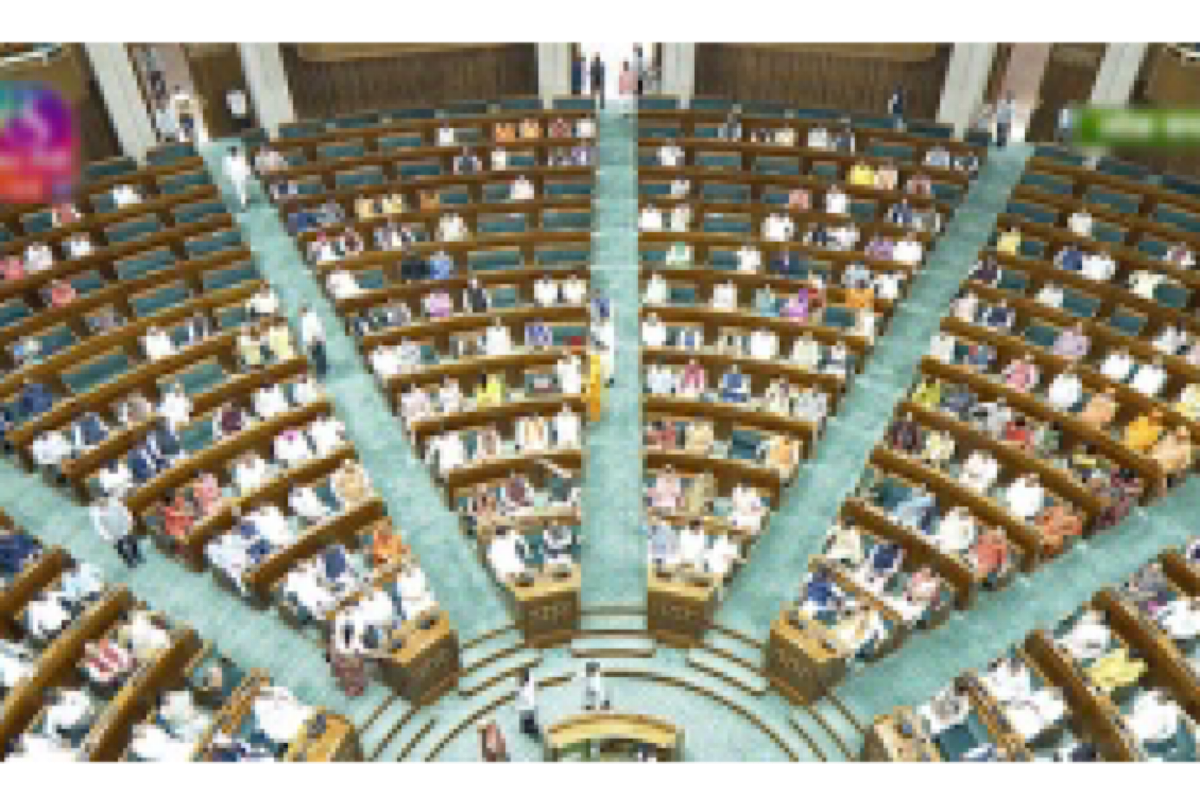JD(S) MP Prajwal Revanna’s sex scandal rocks K’taka BJP; Congress demands answers
"Are these women not Hindus? What about their mangalasutras? The PM should speak up," said Karnataka minister Laxmi Hebbalkar.

Lok Sabha in New Parliament Building (Photo:IANS)
Parliament this week passed a landmark bill for women’s empowerment, which provides a 33 per cent quota for women in the Lok Sabha and legislatures. This gender bill marks a significant milestone towards empowering women in politics. On Wednesday, the Lok Sabha approved the Women’s Bill in Parliament and legislatures through a voice vote. Of 543 MPs, 454 supported the Bill, with only two members opposing it.
The next day, the Rajya Sabha unanimously passed the Bill, with all 215 members voting in favour. With both houses clearing the Bill, kudos are due to the Prime Minister and to all the lawmakers. Mr. Modi praised parliamentarians for overcoming “agni pariksha” and achieving gender equality, highlighting the need for cooperation. It shows that if the BJP and Congress are together, they can pass any bill.
Other parties also claimed credit for the legislation’s success. Congress leaders like Sonia Gandhi celebrated the victory and demanded prompt implementation, calling the bill ‘our Bill”. It is beneficial for parties to appeal to female voters before the upcoming Assembly and Lok Sabha elections. Despite India’s Constitution promoting gender equality, women have been historically underrepresented in Parliament and state legislatures despite making up nearly half of the population. Implementing women’s quotas requires careful consideration of social, political, and cultural factors.
Advertisement
The Bill has faced several obstacles till now. It has been introduced and abandoned multiple times due to disagreements among political parties. However, the primary reason for its failure is the reluctance of male legislators. They fear losing their perceived importance. Efforts to achieve gender balance in politics faced challenges in negotiating the quota. Rajiv Gandhi initiated, and Sonia Gandhi took it forward. Sushma Swaraj encountered opposition from parties like SP and RJD.
The Congress and other opposition parties insisted on a quota within the quota for OBC women. Male politicians also oppose the idea that subquotas were suggested, such as reservations for OBC women within the percentage. Although the status of women has improved in India since the adoption of International Women’s Day in 1975, progress could have been faster. The Bill’s legislative journey started during the Rajiv Gandhi era, but it was introduced in Parliament by Prime Minister Deve Gowda on 27 September 1996.
Despite several attempts by subsequent administrations, it has failed due to a lack of political will and consensus. The Bill was passed by the Manmohan Singh administration in the Rajya Sabha in 2010 but failed to pass in the Lok Sabha. There is a divided opinion on the subject in almost all the parties except the Left. The primary opponents to the Bill were the Janata Dal-United (JD-U)), Rashtriya Janata Dal (RJD) and Samajwadi Party.
Some blame should also attach to the women’s organisations who refused to accept the 20 per cent reservation proposed at one point. Despite the passage, women must wait until after the next Census and delimitation processes are completed by 2029. These exercises will commence after the next Lok Sabha polls. The BJP may leverage this for electoral advantages in the 2024 and 2029 polls.
Several countries have implemented steps to ensure gender equality in political representation. They include reserving some legislative seats and promoting women’s political involvement. India has signed international agreements for gender equality. Reserving political positions for women is in line with these commitments.
The United Nations praised India after Parliament passed the Bill. Susan Ferguson, the Country Representative for UN Women India, stressed the significance of women having political representation to continue their empowerment. She described the Bill as a “bold” and “transformative” measure to help reach this objective. Currently, the law reserves onethird of the chairpersons at all Panchayati Raj Institutions and urban local bodies for women.
As a result, over a million women currently serve at the grassroots level. Supporters argue that a quota is essential to address the underrepresentation of women in Indian politics and decision-making bodies. They believe it will empower women, promote gender equality, and give them a stronger voice. Additionally, it is a step towards correcting the historical gender imbalances. Some say a quota is unfair and may reinforce inequality. Rotating these seats every election could decrease motivation among MPs.
Furthermore, they apprehend women may be chosen based on connections rather than qualifications, leading to accusations of tokenism. The battle for equality is ongoing. While the Bill has been passed in Parliament, more work must be done to address all gender-related concerns.
True empowerment requires shifting people’s attitudes and eradicating harmful practices such as rape, khap panchayats, honour killings, and Sati. Despite having laws in place, their enforcement could be improved. Influential leaders like Sonia Gandhi, Mamata Banerjee, Mayawati, and Mehbooba Mufti have the power to help those who are less fortunate.
The 33 per cent reservation for women is a crucial opportunity whose benefits must be maximized.
Advertisement